#amtor
Explore tagged Tumblr posts
Text

Presently the tharban ceased its offensive and began to back away. I watched the weaving, undulating head of the great snake following every move of its antagonist. The lesser snakes swarmed over the body of the tharban; it seemed not to notice them. Then, suddenly, it wheeled and sprang for the entrance to the corridor that led to its lair. This, evidently, was the very thing for which the snake had been waiting. It lay half coiled where it had been fighting; and now like a giant spring suddenly released it shot through the air; and, so quickly that I could scarcely perceive the action, it wrapped a dozen coils about the body of the tharban, raised its gaping jaws above the back of the beast's neck, and struck!
Art for Edgar Rice Burroughs' Lost on Venus by Fortunino Matania.
This particular segment, the Room of the Seven Doors, is one of those amazingly over-the-top pulpy Situations.
37 notes
·
View notes
Text

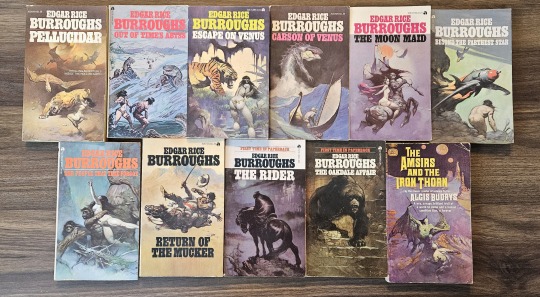
My eBay paperback rampage didn't end at Frank Herbert novels, oh no; I also bought a bunch of old Conan and Edgar Rice Burroughs, the bulk of which just showed up today. Also a book by Algis Budrys that found its way into the Burroughs, probably because it too had a a Frank Frazetta cover.
I also have the other Venus books and I believe all but one of the Pellucidar coming, but they haven't arrived yet. I also need to look into getting all of the John Carter series.
That copy of Red Nails is particularly rough, its front cover is held on by tape. Also both the Howards no longer have the full color fold-out posters advertised on the covers.
#robert e. howard#l. sprague de camp#lin carter#bjorn nyberg#robert jordan#poul anderson#john maddox roberts#leonard carpenter#roland green#edgar rice burroughs#algis budrys#frank frazetta#conan the barbarian#pellucidar#amtor#fantasy#sword and sorcery#science fiction#planetary romance
2 notes
·
View notes
Text
...
'Scuse me, LOTS of tags coming...
Also, wait, why is John Carter blond?










James E McConnell pulp cover art for novels by Edgar Rice Burroughs
#Tan Hadron#Hadron of Hastur#Carson Napier#Tarzan#John Carter#Gahan of Gathol#Tara of Helium#Ulysses Paxton#Vad Varo#Thuvia#Barsoom#Amtor#John Carter of Mars#ERB#Edgar Rice Burroughs#Pulp Heroes
50 notes
·
View notes
Text
GUYSSSS fragt mich nicht woher ich das weiß aber in den letzten paar tagen wurden deutlich mehr deutsche politik fanfictions gepostet
#schön dass wir alle aud die gleiche art copen#es gibt SO VIEL amtor x fabian köster#... wichtig und richtig#german stuff#i'm sorry#bundestagswahl 2025#btw2025#german politics#my post
52 notes
·
View notes
Note
I'd really love the sci fi reading list, if it's not too difficult! Thank you for your explanation
Yes! Okay, requisite this is Not Authoritative Or Comprehensive claim, I'm a dork with a Russian degree, but here we go:
(I tried to organize this chronologically because if I did it thematically we would be here all day. Also, I still have more books, but they get increasingly niche. This is a Greatest Hits playlist, and if you look these people up, you will find their contemporaries)
(Long list below the Read More)
Jules Verne — 80,000 Leagues Under the Sea, Journey to the Center of the Earth. Excellent continuations of that exploration/'ostracized' genius figure, so popular in the previous century. French, so English translations. Kinda marks the transition point between 19th c. pure spec exploration and what we would call sci-fi. BUT BEFORE HIM...
Mary Shelley — Frankenstein is probably the first sci-fi novel as we know it. BUT BEFORE HER...
Margaret Cavendish — Okay, the 'first sci-fi novel' is hard to define for obvious reasons, but The Blazing World has as good a claim as any. Published in the 17th c., so it really traverses the genres, but includes a utopian kingdom accessible via the North Pole. Her husband was so impressed that he composed a sonnet for her, which serves as the epigraph for the novel; it's a wild read in the same way Robinson Crusoe and other early novels are, and I'm mostly including it here because it's so, so wild to read in 2023.
John W. Campbell — That dude. The hero's journey guy. His short story Who Goes There? Has been adapted a million times into a little movie called The Thing. Unfortunately got really into race science, so Isaac Asimov told him to fuck off. Edited the magazine Astounding Science Fiction, which in 1939 published Black Destroyer by Alfred Van Vogt, usually cited as the beginning of Golden Age sci-fi.
H. G. Wells — Big critic of class divisions in Victorian English society, coined the term 'time machine' as we think of it in his novel...The Time Machine. A lot of what we consider 'classic' time travel tropes were, if not invented here, had their seeds planted here. Also famous for War of the Worlds, leading to a MINOR disturbance when Orson Welles did a dramatic radio reading.
Edgar Rice Burroughs — the man, the myth, the legend. If I could persuade you to read one white English sci-fi author with rather dubious politics, it would be him, if only because of how influential he was. Mostly famous for Tarzan, but he also wrote a whole series about Hollow Earth that crosses over with Tarzan at some point (Pellucidar), as well as the series Barsoom (A Princess of Mars and its sequels), and Amtor (Guy named Carson Napier gets transported to Venus, which was a watery hellscape, as was popularly theorized for a while).
They're basically pulp comics before pulp comics, published in magazines, extremely lurid and dramatic, and he did write his own crossovers. These were what the first modern superhero comics writers often grew up reading and what inspired them—John Carter's cultural cachet was borrowed by Superman until it became his cultural cachet.
They're very fun, but also supremely products of their time, and extremely fond of the British Empire.
Judith Merrill — prolific writer and editor, who also wrote one of my personal favorite reactions to the atomic bomb in Shadow on the Hearth.
Gabriel García Márquez — we're gonna take half a sidestep into magical realism here (which is, to define quickly, a genre incorporating the fantastic into otherwise realistic narratives, often formed and associated with decolonial and post colonial Latin American fiction, but not always. It's a fuzzy genre). He wrote in Spanish, but I read him in English. One Hundred Years of Solitude is probably one of the great novels ever written. My mother is also telling me to rec Love in the Time of Cholera and she wrote about the man, so listen to her.
Jorge Amado — the sixties were the big magical realism heyday. Amado was Brazilian and his Dona Flor and her Two Husbands is a book my Spanish high school teacher made me swear to read some day.
Andre Alice Norton — Deserves a spot for being one of the most prolific sci-fi authors of all time during a time when sci-fi was INCREDIBLY inhospitable to women. Over 300 books!
Robert Heinlein — This man is the poster child for "male author who writes groundbreaking sci-fi novels but cannot be normal about women with a gun to his head". The Moon Is A Harsh Mistress is excellent and incredibly important for how comprehensive the creation of Luna and its workers was, even if it is very sixties free love. Also wrote Starship Troopers, the novel.
Edward Smith — you haven't seen drama until you read what they said when Lensman (first book is Triplanetary) lost to Foundation for the Hugo in the sixties.
Larry Niven — Fleet of Worlds! Ringworld won a whole host of awards and deservedly so in 1970. Fair warning, his stuff decidedly falls under "hard" sci-fi (lots and lots of discussion for plausible alien artifacts), though it is awesome just in terms of how he can communicate scale. If you see a big ring-like structure in space, you can thank this guy, basically (the term ringworld comes from here). Also did a bunch of co-writing. I haven't read his other stuff, but CoDominium is on my list (he co-wrote it. First book is The Mote in God's Eye). If you liked the TV show The Expanse when it did the alien stuff and the later books it never got to adapt, you'll love this guy.
Samuel R. Delaney — Dhalgren is a book I am forbidding you to research before reading. Go in prepared. You have been warned. You will either love this book or set it on fire.
Stanislaw Lem — Solaris. I started this novel last week after watching the Tarkovsky film and. It's doing something to my brain, that's for sure. It's a book where I have to read every sentence twice. If you read it, find a good translation if you don't speak Polish. The author famously is very mad at critics who use Freudian analysis for it, so tread carefully (it's about the limits of rationality and our ability to understand, so. Fair).
Joanna Russ — The Female Man is a seminal work of feminist sci-fi. It's—fascinating, to be honest. Discusses socially enforced dependence of women on men and the creation of a different gender, a "female man", when the protagonist chooses to reject it and thus her socially enforced gender. I wouldn't call it a transgender manifesto (written in 1975, features insufficiently masculine men undergoing sex change surgery, so...yeah) but it definitely awoke something in my brain when I was 16 lol. I would LOVE to see it revisited in literary criticism from a modern perspective, especially from trans people.
C.J. Cherryh — If we talked about female sci-fi authors from the 1950s-70s writing under gender ambiguous aliases, we would be here all day, so I'm picking the one whose books I got for cheap at a book sale. Her Foreigner series has such a good premise with descendants of a lost Earth ship and interstellar court drama, and it's SO fun.
Poul Anderson — the name is not a typo, do not look up Paul Anderson, you will never find him. I actually have a copy of Three Swords and Three Lions currently collecting dust on my shelf and judging me right now as I wait to read it. Tau Zero is one of the greatest things I've ever read. The time dilation stuff gets kinda dense at times, but he incorporates some interest in his Swedish history and folk tales into it, and his explanation of travel at the speed of light and incorporating that into his discussion of nationalism is incredible. The ending where they survived [REDACTED] and landed on what may have been [REDACTED] has been bouncing around my brain for a bit now.
Laura Esquivel — Like Water for Chocolate is from the magical realism reading list.
Salman Rushdie — Midnight's Children is one of those bucket list books, for better or worse. Recontextualized Indian independence from the British and the Partition through framing of a husband telling the story to his wife, as he actively tells the story to her. Really uses the fantastical versus the real w/history versus truth so well.
Nancy Farmer — The Ear, the Eye, and the Arm, for the kids lying about their age on Tumblr dot hell. Three kids try to escape a kidnapping after sneaking out—in 23rd century Zimbabwe. With the help of three mutant detectives. It rules.
Ben Okri — Okay, I have not read his stuff yet, but it is on my list. Other people here have discussed his influence on them in post colonial sci-fi. His big one is The Famished Road, first in a trilogy, and renowned for its discussion of the spiritual and realist world coexisting in African animist spiritual life.
Nnedi Okorafor — I have read one of her short stories, Remote Control, and currently have an book list with her other stuff on it. Other people I know vouched for her work. She specifically writes Africanfuturism and Africanjujuism centered around her Nigerian background, and follows on from the likes of Okri and Octavia Butler. I'd also add if you're a Stephen King fan when he's in Dark Tower mode, she's probably gonna have things that appeal to you.
Mentions that are absolutely influential but don't need explaining on this website: Franz Kafka, Ursula K Le Guin, Douglas Adams, N. K. Jemisin, Ray Bradbury, Arthur C Clarke, Isaac Asimov, Frank Herbert, Alduous Huxley, Philip K. Dick, Orson Scott Card, Kurt Vonnegut, George Orwell, Octavia Butler, Neil Gaiman, Toni Morrison.
(to be clear: you SHOULD read them, but you probably know who most of them are and/or why they're big deals. Most of them are also incredibly prolific, and explaining their bodies of work are other posts. Trying to make a list about other folks)
For more on Afrofuturism,(not to be confused with Africanfuturism), I recommend the shit out of Afrofuturism: The World of Black Sci-Fi and Fantasy Culture, full of short stories and guides to art and music. I, alas, lack similarly useful authoritative guides to other genres, but I have read that one, so wanna toss it out there. There's so much.
10 notes
·
View notes
Text
Servus!
Das habe ich von meinen bayrischen Freunden beim Vorbereitungsseminar gelernt 😌.
Das VBS war echt richtig cool und es waren sooo viele nette und offene Menschen da. Hätte mir wirklich keine bessere Gruppe vorstellen können. Die Aufregung auf das Auslandsjahr steigt aber natürlich immer mehr. Vor allem dadurch, dass wir die letzten Tage NUR über den Alltag in den USA geredet haben. (Innerlich weine ich gerade weil ich noch kein Placement habe). Das aller coolste war aber mit Abstand der Besuch im Reichstagsgebäude. Also wenn ich ehrlich bin sieht der Bundestag im Fernsehen 10000 mal größer aus. War natürlich trotzdem eine einzigartige Erfahrung. Und nebenbei haben wir sogar Philipp Amtor gesehen 🧑🏻💼
Naja jedenfalls habe ich jetzt ein ganz tolles GIVE e.V T-Shirt und viele neue Freunde aus ganz Deutschland. Ich bin sooo gespannt darauf mit wem ich dann im August schlussendlich fliege und wie die Reise so wird.
Aber bis dahin:
I’ll keep you updated 🦅🦅🇺🇸
hier noch ein paar Fotos zur Veranschaulichung des oben geschriebenen Textes 🤓



3 notes
·
View notes
Text
Cannot imagine bouncing of Barsoom, but dif'rent strokes, etc.
I actually read the Venus books first! Anyways, they are notably different from ERB's earlier Sword and Planet works for two reasons:
1: Carson is much less of an invincible, all-conquering badass than many of ERB's heroes; he screws up quite a bit and gets by as much by trickery as force of arms.
2: They are full of attempts at political satire/commentary.
Pulptober 11th - Feats of Courage, Feet of Clay - Carson Napier

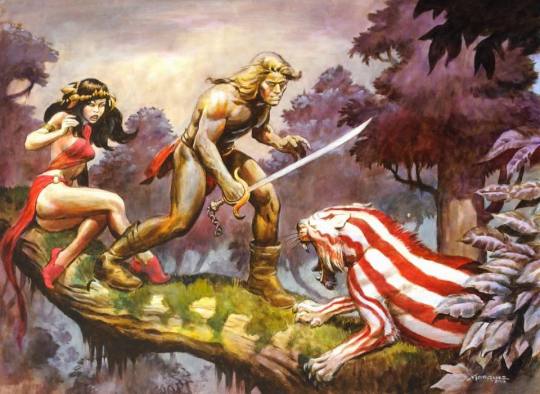
I bounced off the Mars novels by ERB quite hard, so I know even less about this fellow, but he seems to be another sturdy swashbuckler in the sword-and-planet sphere and that rates a few crumbs of curiosity. Art by Richard Hescox and Don Marquez
#Carson Napier#Amtor#ERB#Edgar Rice Burroughs#Pulp Heroes#Pulptober#Pulptober 2024#Inktober#Inktobers#Inktober 2024#Richard Hescox#Don Marquez#themailedfist-blog
9 notes
·
View notes
Text
Lost on Venus
See on Amazon I recently had the pleasure of delving into ‘Lost on Venus’ by Edgar Rice Burroughs, the second installment of his Amtor series. Let me tell you, this book takes you on an exhilarating rollercoaster ride that leaves you breathless and yearning for more. If you’re a fan of Burroughs’ work, such as Tarzan or the Martian novels, you won’t want to miss out on ‘Lost on Venus’. But even…
0 notes
Text

i get paid a commission when you purchase with this link-
#PetSafety#HarnessTraining#DogHarness#CatHarness#SecureFit#ComfortableHarness#OutdoorAdventures#PetTravelGear#AdjustableStraps#PetHarnessFashion
0 notes
Text
youtube
This is the first part of a modular video I made for Amtore Tecnologia to introduce prospective clients to their company and portfolio of projects.
The video was made using Adobe Premiere Pro and After Effects
There are three versions, one in english, one in portuguese and one in spanish. The portuguese version was voiced by a professional and I was involved in every step of the production, from recording the lines in a studio to editing the audio. The english and spanish versions were voiced by AI.
After getting the audio set up I got together with Amtore's Director and we chose pictures and videos to make up each modular block of the final video.
The blocks each have a theme, the first one, which you can find on the begining of this post, is an introduction to the company. The next 8 blocks are each about a specific project Amtore has participated in, and the final block is a conclusion to the video talking about the company's values.
I used after effects to add motion and text for an easier understanding of the content in the video.
0 notes
Text
Come for the Planetary romance, stay for seeing ERB attempt political commentary.
Do you know who the art is by?
Pulptober 2024: 11 - Carson Napier of Venus

Yet another hero created by Edgar Rice Burroughs, this time, on Venus. Originally, Carson Napier set out to fly to Mars, but somehow got lost, and landed on Venus instead, where he then had a bunch of adventures.
Honestly, it sounds fun. Not the most original of ideas, but fun.
#Carson Napier#Amtor#ERb#Edgar Rice Burroughs#Pulp heroes#Pulptober#Pulptober 2024#Inktober#Inktobers#Inktober 2024#oldtvandcomics
23 notes
·
View notes
Photo

Frank Frazetta’s cover for Carson of Venus by Edgar Rice Burroughs.
499 notes
·
View notes
Photo

“Tongzan” by Daniel Bensen. This creature appears in The Living Dead, which is part of Escape on Venus, which is part of Carson Napier of Venus, which is by Edgar Rice Burroughs.
#daniel bensen#bensen daniel#edgar rice burroughs#amtor#carson napier of venus#alien#creature#monster#jj
14 notes
·
View notes
Text
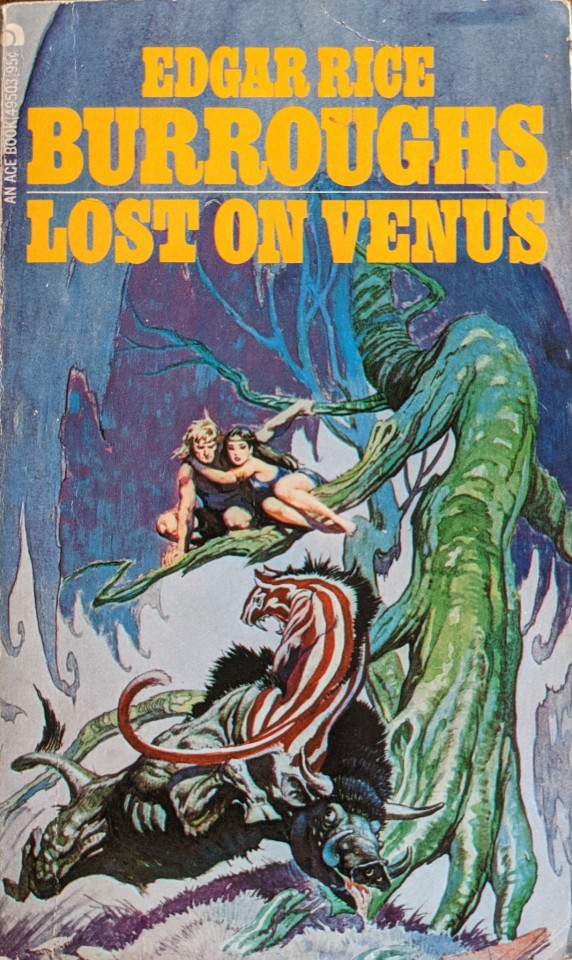
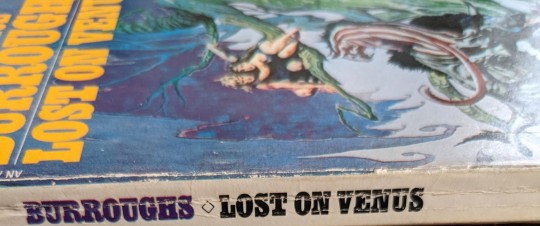
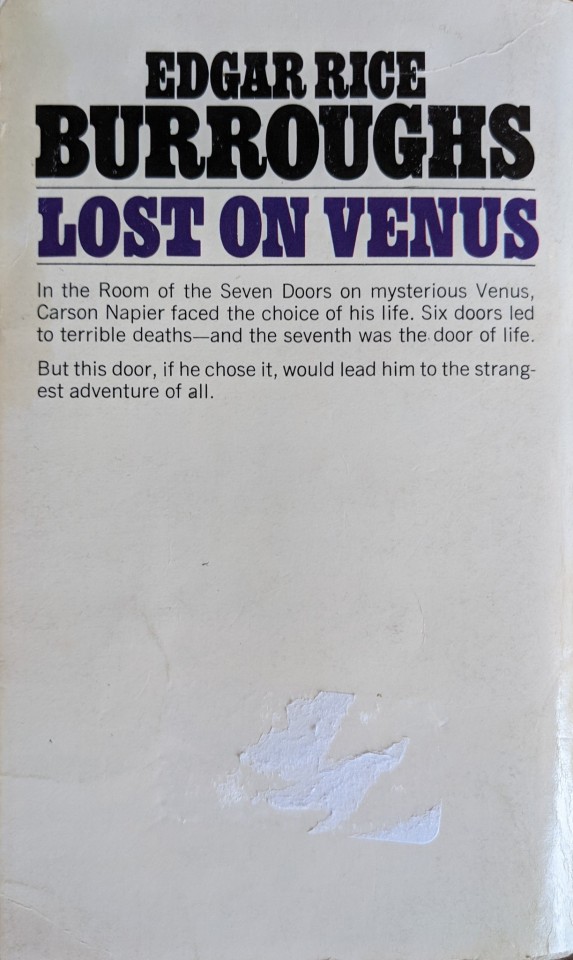
Lost on Venus. Edgar Rice Burroughs, 1933. Cover art uncredited.
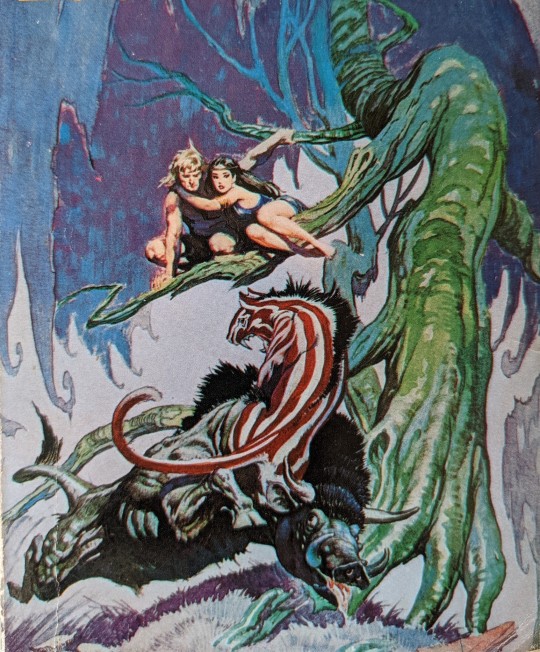
#lost on venus#edgar rice burroughs#science fiction#book#art#book cover#aesthetics#retro scifi#scifi#venus#venus series#amtor#carson napier
13 notes
·
View notes
Text

Bought a cool lot of 15 Edgar Rice Burroughs books on eBay a little while ago. Some great covers too. Can't wait to crack one open after work.
Which have you read and what did you like about it (no spoilers)?
Do you like pulp literature? What pulp books or magazines have you read?
#pulp#pulp literature#edgar rice burroughs#tarzan#pellucidar#carson of venus#the war chief#amtor#science fiction#sci fi & fantasy#sci fi#scifi#adventure novel
4 notes
·
View notes
Text
I'm going to start calling Edgar Rice Burroughs' Barsoom, Pellucidar, and Amtor stories isekai from now on and nobody can stop me.
1 note
·
View note